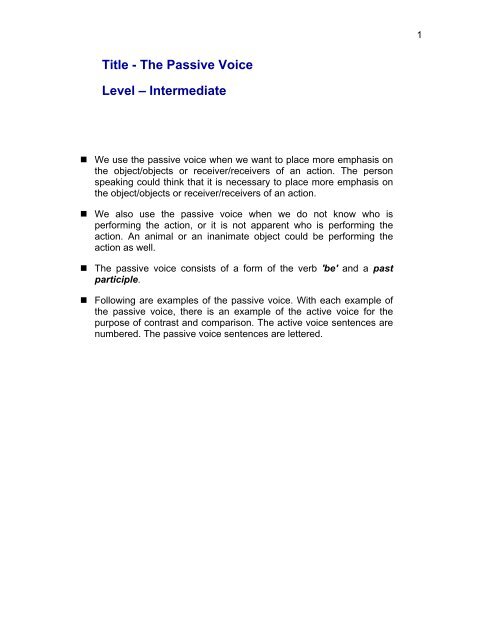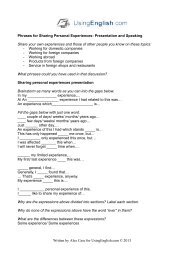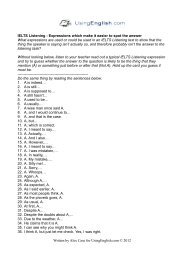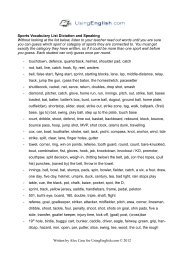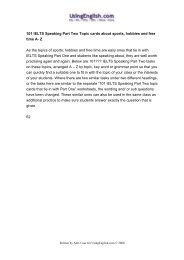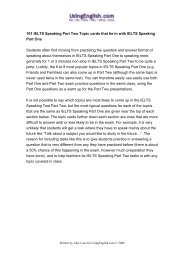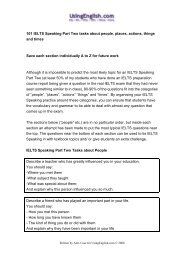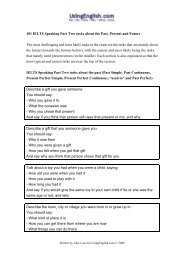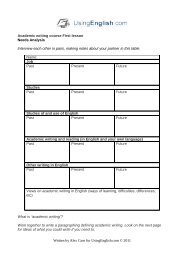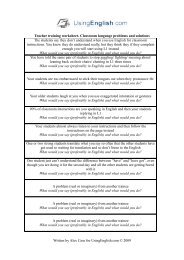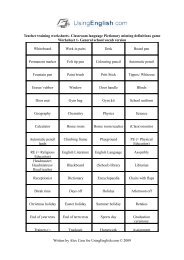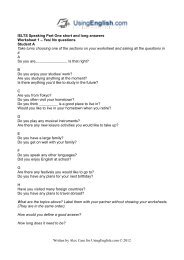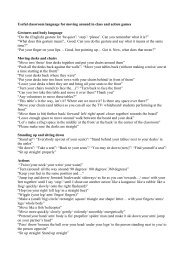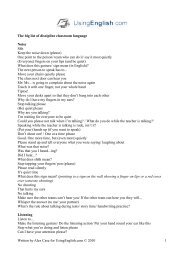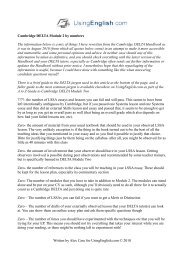Title - The Passive Voice
Title - The Passive Voice
Title - The Passive Voice
You also want an ePaper? Increase the reach of your titles
YUMPU automatically turns print PDFs into web optimized ePapers that Google loves.
<strong>Title</strong> - <strong>The</strong> <strong>Passive</strong> <strong>Voice</strong><br />
Level – Intermediate<br />
� We use the passive voice when we want to place more emphasis on<br />
the object/objects or receiver/receivers of an action. <strong>The</strong> person<br />
speaking could think that it is necessary to place more emphasis on<br />
the object/objects or receiver/receivers of an action.<br />
� We also use the passive voice when we do not know who is<br />
performing the action, or it is not apparent who is performing the<br />
action. An animal or an inanimate object could be performing the<br />
action as well.<br />
� <strong>The</strong> passive voice consists of a form of the verb 'be' and a past<br />
participle.<br />
� Following are examples of the passive voice. With each example of<br />
the passive voice, there is an example of the active voice for the<br />
purpose of contrast and comparison. <strong>The</strong> active voice sentences are<br />
numbered. <strong>The</strong> passive voice sentences are lettered.<br />
1
Active and <strong>Passive</strong> - Simple Present, Simple Past, and<br />
Simple Future<br />
1. Some people drink coffee every morning.<br />
1. simple present active voice<br />
A. <strong>The</strong> mail is delivered in the morning.<br />
A. is/are + past participle = simple present passive voice<br />
2. It was very cold yesterday.<br />
2. simple past active voice<br />
B. A heavy snowstorm was forecast on the news last night.<br />
B. was/were + past participle = simple past passive voice<br />
3. He said that he would send the package on Wednesday and<br />
that it should arrive on Friday. <strong>The</strong>y’ll deliver the package on<br />
Friday.<br />
3. simple future active voice – “will”<br />
C. <strong>The</strong> package will be delivered on Friday.<br />
C. will be + past participle = simple future passive voice<br />
2
Active and <strong>Passive</strong> - Present Progressive/Continuous, Past<br />
Progressive/Continuous, Future Progressive/Continuous<br />
note: <strong>The</strong> future continuous/progressive is not often used with<br />
the passive voice<br />
1. What are you doing now? I'm eating lunch. What about you?<br />
1. present progressive/continous active voice<br />
A. <strong>The</strong> packages are being picked up on Tuesday and<br />
should arrive by Friday.<br />
A. is/are being + past participle = present<br />
progressive/continuous passive voice<br />
2. He was drinking coffee and listening to the news on the radio<br />
this morning.<br />
2. past progressive continuous active voice<br />
B. His car was being repaired, so he asked his friend for a<br />
ride to work.<br />
B. was/were + past participle = past<br />
progressive/continuous passive voice<br />
3. We will be talking about that next week. I really look forward<br />
to it.<br />
3. future progressive/continuous active voice<br />
3
Active and <strong>Passive</strong> - Present Perfect, Past Perfect, Future<br />
Perfect<br />
1. I still haven't read that book.<br />
1. present perfect active voice<br />
A. "I'll get to that soon." Those words have been spoken<br />
many times before.<br />
A. has/have been + past participle = present perfect<br />
passive voice<br />
2. He had not known if the mailman delivered the package he<br />
was expecting until he went downstairs to check. He was glad<br />
to see that it was there. He took it upstairs and opened it.<br />
2. past perfect active voice<br />
B. <strong>The</strong> package still had not been delivered by the end of<br />
the day. He was told it should arrive today. He was<br />
wondering where it was.<br />
B. had been + past participle = past perfect passive voice<br />
3. I hope the rain will have stopped by the time we leave, as<br />
none of us brought umbrellas. It’s raining very hard.<br />
3. future perfect active voice<br />
C. I think the package will have been delivered by<br />
Wednesday.<br />
C. will have been + past participle = future perfect passive<br />
voice<br />
4
Active - Present Perfect Progressive/Continuous, Past<br />
Perfect Progressive/Continuous, Future Perfect<br />
Progressive/Continuous<br />
Note: <strong>The</strong> progressive/continuous forms of the perfect<br />
aspects/tenses are hardly ever used in the passive voice.<br />
1. We have been waiting for the bus for about fifteen minutes.<br />
1. present perfect progressive/continuous<br />
2. I'm glad you mentioned that because I had been thinking<br />
about bringing it up for quite some time.<br />
2. past perfect progressive/continuous<br />
3. I will have been studying English for 6 months at the end of<br />
June. We will have been living in this city for almost a year at<br />
the end of May.<br />
3. future perfect progressive/continuous<br />
"<strong>The</strong> <strong>Passive</strong> <strong>Voice</strong>"<br />
© 2003 – 2005 Steven David Bloomberg<br />
steven.david@verizon.net<br />
questions.steve@verizon.net<br />
5


